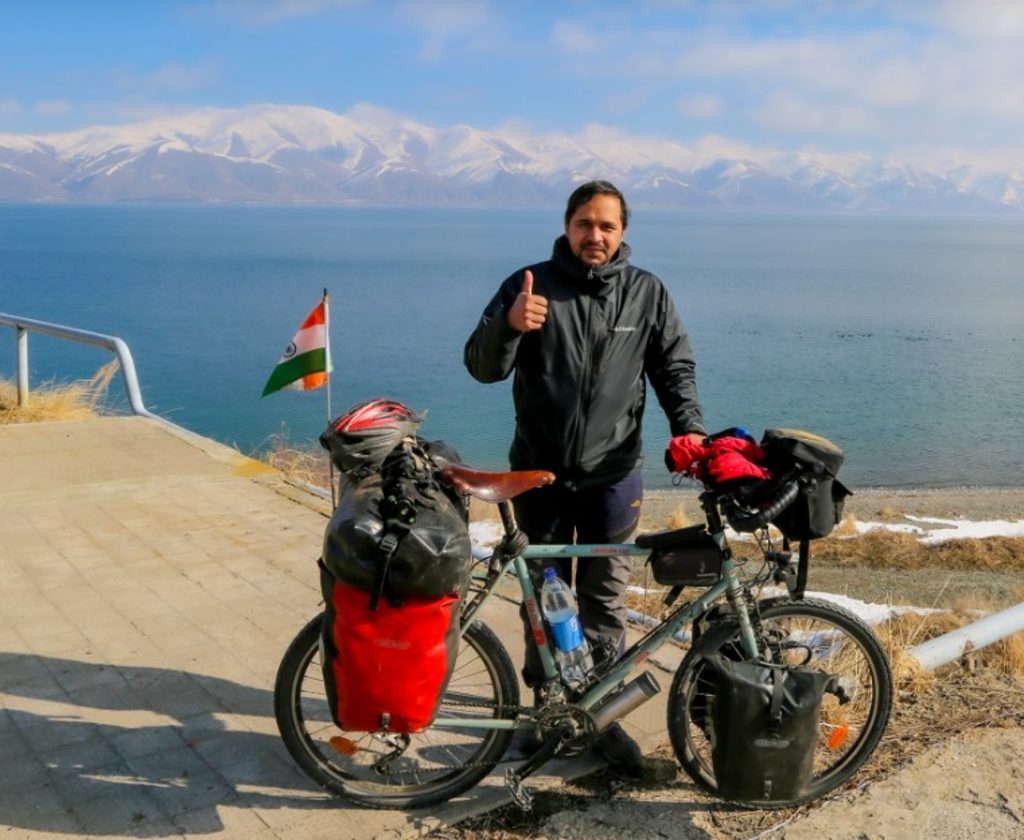Doctor Raj Phanden, 46, a Ayurvedic doctor from Bhuna, Haryana, India, known globally as Cycle Baba visited Fiji on his bike last month. As an Ayurvedic doctor, he is a practitioner of ancient Indian medicine.
They focus on holistic health, aiming to balance the mind, body, and spirit through various natural therapies.
This includes personalized diet and lifestyle recommendations, herbal remedies, and other treatments to promote overall well-being and prevent disease.
He has been on an extraordinary mission — cycling around the world raising awareness on environmental protection, healthy living, and ancient Indian medicine.
His visit to Fiji lasted 15 days and he said he loved the land and its people.
This was the 128th country, he has visited driven by adventure after his deep personal loss.
In 2015, Dr Phanden lost his wife in a road accident and both his parents shortly after.
Consumed by grief, he turned to sleep and medication for solace, but soon realised that life had more meaning.
“I said to myself, this is not my life, and that is how I begun this journey,” he said.
“I wanted to do something meaningful —not just travel, but carry a message of peace and environmental awareness.
Cycling felt like the most humble and impactful way to connect with people.”
He didn’t have a background in cycling nor any adventure background but he had a strong will to do something different with his life. Dr Phanden said he left everything behind and took to the road — with only his bicycle as a companion and a will to make a difference.
He shared that every country teaches something new and it was like reading a new book at every border.
The most physically demanding stretch of road or terrain during his travels was the Nullarbor Desert in Australia, the Pamir Highway in Central Asia and the Sahara Desert in Africa.
“These places had long distances, extreme weather conditions, and minimal support made them real tests of endurance,” he said.
Dr Phanden said he never usually planned his routes and destinations as most of the time the locals gave him suggestions.
Speaking from experience, he said every country had different rules and regulations that he had to adhere to.
“I carry all my documents carefully, stay updated on regulations, and move forward with patience and respect.”
He highlighted that the Indian High Commissions around the world were always happy to help him on his journeys.
Some of the memorable cultural experience he encountered was the hospitality from Iran and Afghanistan, and the nomadic life in Mongolia.
“The people of Iran and Afghanistan surprised me the most due to the love, trust and hospitality I received from them, and that changed my perspective completely,” he said.
“The people from these countries also taught me how beautiful and diverse humanity is.”
One of the challenges Dr Phanden faced on his journey was cultural misunderstandings.
He is often met with language and body language misunderstandings but says a smile and a calm approach resolves everything.
Dr Phanden said people were mostly shocked when they see him travelling the world on a bike. Yet when they learn of his story, they’re full of respect, curiosity, and support towards his journey.
He spreads the message of humanity, environmental awareness and unity.
“I want to show the world that despite our differences, we’re all connected.”
He combines adventure with advocacy through his travels by meeting locals, speaking in schools, attending events and sharing stories on his online platforms.
He has also worked with some NGOs like Lions Club International.
Dr Phanden said his journey was making global impacts, as people have reached out to him about their opinions on the environment, and on breaking boundaries.
“That’s the impact I hope to continue making and many people have also sent me pictures of trees we planted throughout my journey,” he said.
The bike he uses on his travels are specially designed for tours.
He said it carries all his essentials —panniers, solar panel, tent, tools, cooking gear, and camera equipment. “Simple but solid.”
On long journeys, he regularly cleans and checks his bike and has learned to fix most problems himself.
He sometimes faced technical failures, and recalled when he got into accidents in Malaysia and another in Rwanda.
“I film my journey daily and upload it on YouTube. I also share updates on Instagram and Facebook.
My audience are part of my journey — it’s their journey too.”
Dr Phanden said people from all over the world have supported and encouraged him and many have said his videos inspired them to dream bigger.
He said this journey has made him humble, patient, and more grateful.
He has seen both kindness and hardship and it has made him realise how similar we all are as human-beings.
Here in the Pacific, he plans to visit as many reachable islands as possible.
He said some challenges were cultural differences, remoteness, or language barriers, but people have generally been kind and welcoming towards him.
The biggest lesson he has learned from the road is that the world is more kind than cruel.
“If your intentions are good, people open their hearts — even strangers.”
He said he valued people like God.
Dr Phanden said there were times when he would feel lonely and overwhelmed, but he always reminded himself of his mission, his supporters and the thousands of people who have welcomed him around the world.
He said he doesn’t think this journey will ever truly end but one day he hopes to start a global foundation for peace and environmental awareness.
His advise is, “Don’t wait for everything to be perfect. Start!.”
DR Phanden infront of the LICI building in Suva during his visit last month. Picture: ANASEINI DIMATE





